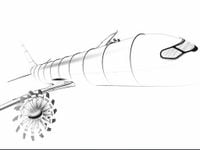During the recent Airbus Summit 2025 held on March 24 and 25, major updates regarding the future of commercial aviation were unveiled, unveiling ambitious plans from Airbus. The European aeronautics leader shared insights on a next-generation single-aisle aircraft designed to enter service in the second half of the 2030s, boasting significant advancements aimed at reducing environmental impact and improving efficiency.
Airbus indicated that this new aircraft model is designed to achieve an impressive 20 to 30% reduction in fuel consumption compared to its current generation. As an essential benchmark, the next-gen aircraft will have the capability to operate using up to 100% Sustainable Aviation Fuel (SAF). Airbus has unveiled innovative design elements, notably including foldable wings that enhance aerodynamic performance while contributing to the aircraft’s fuel efficiency.
Bruno Fichefeux, Head of Future Programmes at Airbus, emphasized the importance of this development, stating, “Every second, an Airbus aircraft takes off, connecting passengers, cargo, and businesses worldwide. We aim not just to sustain but significantly enhance our aircraft’s performance and initiate a paradigm shift in aviation.”
The summit also emphasized the integration of new technologies such as open fan engines and new-generation batteries, which are vital for improving the efficiency of aircraft systems. Airbus's 'Wing of Tomorrow' program, located at its facility in Filton, UK, is particularly focused on pioneering new wing designs and technologies for future aircraft.
Partnering with CFM International, Airbus is currently working on the RISE (Revolutionary Innovation for Sustainable Engines) engine demonstrator, aiming to showcase substantial efficiency enhancements. This research considers new engine designs that promise up to a 20% reduction in fuel consumption and CO2 emissions compared to the highest-performing existing engines.
Testing for the RISE engine is scheduled on the A380 test aircraft by the end of the decade, marking a significant milestone in sustainable propulsion technologies. In addition to traditional fuel options, Airbus is also exploring hybrid-electric propulsion systems, which could help reduce carbon emissions by as much as 5%. These developments are part of a broader initiative to promote sustainability in the aviation sector.
Moreover, Airbus has spotlighted its ZEROe project, which focuses on developing hydrogen-powered aircraft. This commitment is viewed as pivotal for decarbonizing aviation, especially as the industry sets a path toward net-zero carbon emissions by 2050. Glenn Llewellyn, Head of the ZEROe Project, shared insights into the hydrogen initiatives stating, “Hydrogen is at the heart of our commitment to decarbonise aviation... fully electric aircraft powered by hydrogen fuel cells have the potential to revolutionise air transport.”
The future hydrogen aircraft concept showcased at the summit is expected to be powered by four electric propulsion engines, each featuring a fuel cell system that converts hydrogen and oxygen into electrical energy. Such innovations continue to align with Airbus's commitment to evolve aviation technologies responsibly as regulatory frameworks advance, ensuring seamless integration of hydrogen aircraft into the market.
A crucial aspect of Airbus's advancements extends beyond aircraft efficiency to include strategies aimed at mitigating climate impact. The PACIFIC project, backed by the European Union, engages multiple stakeholders, including Rolls-Royce, to study and reduce condensation trails—an important concern linked to global warming. With goals ranging from 2025 to 2028, PACIFIC aims to improve how contrails affect the climate by understanding the interactions between fuel composition and particulate emissions.
As Airbus advances toward these ambitious goals, they leverage materials science to foster lighter and more durable materials for aircraft, resulting in enhanced performance. The Multifunctional Fuselage Demonstrator project, which utilizes carbon fiber reinforced thermoplastic polymers (CFRTP), highlights their innovation focus, showcasing that advancements in material science contribute significantly to achieving energy efficiency.
In summarizing their initiatives, Airbus noted, “We are laying the groundwork for the future of aviation. Our teams are working tirelessly to ensure we make informed decisions regarding engine offerings, wing designs, and technological innovations for upcoming aircraft.” These efforts illustrate Airbus's responsibility in leading the transition towards a significantly more sustainable aviation industry.
The discussions at the Airbus Summit 2025 highlighted that while challenges exist in evolving aviation technology, Airbus is committed to pursuing innovations. The ongoing development of electric and hydrogen propulsion systems, alongside enhanced materials and operational efficiencies, showcases their blueprint for a future driven by sustainability. This momentum not only holds promise for Airbus but potentially for the aviation sector as a whole.






